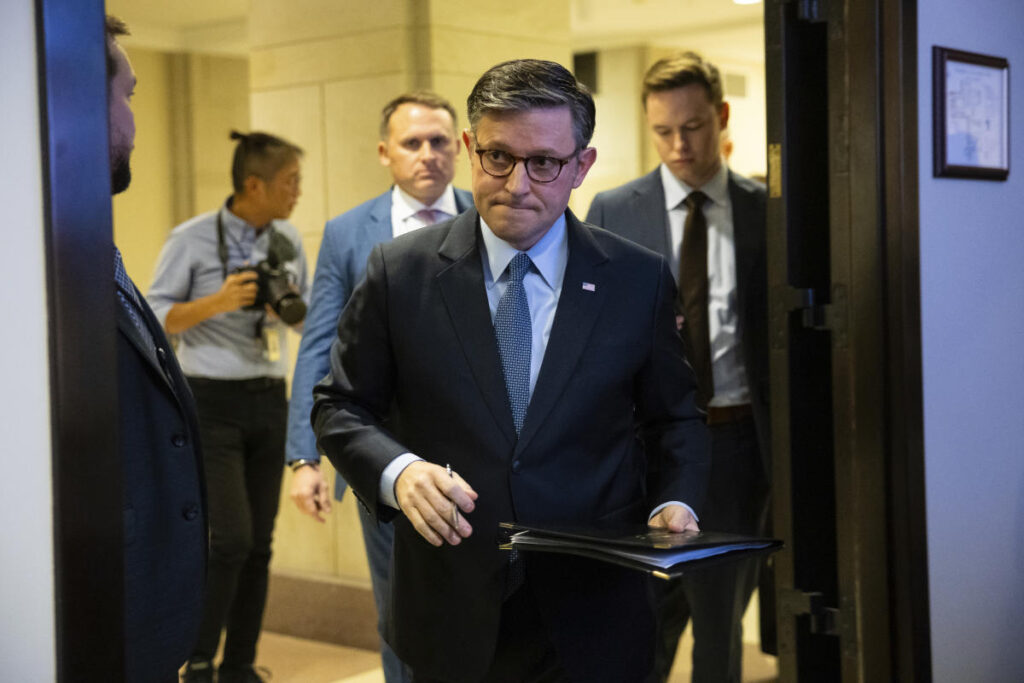Speaker Mike Johnson is currently navigating a complex political landscape as the impending government shutdown looms, with a deadline approaching this Friday. Faced with mounting pressure from various factions within the Republican Party, Johnson’s originally proposed spending plan has come under heavy criticism from significant figures, including Donald Trump, JD Vance, and Elon Musk. Their concerns revolve around the inclusion of substantial financial provisions, such as $100 billion in disaster aid and an extension of the farm bill. Notably, both Trump and Vance have called for immediate discussions on the debt ceiling, signaling their willingness to consider a government shutdown as a tactical option. This internal conflict is accentuated by dissension within the ranks, as some hardline conservatives have expressed intentions to oppose Johnson’s leadership due to funding disagreements.
As the clock ticks down to the deadline, Johnson grapples with the reality that some conservative members of his party demand deeper spending cuts in exchange for supporting ambitious policy initiatives slated for next year, particularly in areas like border security, energy reform, and tax changes. Although most Republicans acknowledge the necessity for financial trimming, the quest for significant savings presents a challenge that could impede the party’s legislative agenda, which Republicans had hoped to advance swiftly following a possible Trump administration re-election. Johnson faces the daunting task of uniting an ideologically diverse caucus while attempting to maintain a fragile alliance with Trump, who has proven to be unpredictable and influential in shaping party dynamics.
Internal conflicts seem to be manifesting as dissent grows among Republicans. Kentucky Rep. Thomas Massie has emerged as a vocal opponent, breaking ranks to announce he will vote against Johnson for speaker, highlighting dissatisfaction within the party. Several other members who had previously pledged support for Johnson are now wavering, reflecting a broader unease. Additionally, alternative candidates for leadership are being discussed among the House Freedom Caucus, presenting a challenge to Johnson’s position. Prominent figures like Rep. Paul Gosar and Rep. Andy Biggs have publicly expressed their reluctance to commit to Johnson, underscoring the precarious support he currently enjoys.
Further complicating Johnson’s predicament is the impact of Trump’s statements, particularly a recent message articulated alongside his incoming vice president. This statement underscored an urgency for addressing the debt ceiling and hinted at the potential for a government shutdown as a bargaining tool in negotiations. Elon Musk’s dissent regarding Johnson’s funding bill has added a new layer of external pressure, as he urges politicians supporting the current plan to be voted out in future elections. In light of this escalating opposition and criticism, Johnson is reconsidering his strategy, contemplating the introduction of a “clean” and short-term funding bill to stave off immediate crisis while providing more time for negotiations.
Amidst this strife, the Republican Party is grappling with fundamental questions regarding its legislative strategy. There exists a split on whether to consolidate their priorities into one comprehensive package or to segment them into two distinct initiatives. Key party strategists, such as Ways and Means Chair Jason Smith, advocate for a unified approach to maximize support across the party. In contrast, dissenters within the party continue to push for a bifurcated strategy, which may lead to fragmented support. The differing opinions on how to structure legislative efforts reflect deep ideological divides and the competing priorities of lawmakers.
Moreover, there is a growing insistence among conservatives, especially those affiliated with the House Freedom Caucus, that any new spending must be matched with equivalent cuts. This stance could further complicate ongoing negotiations as they attempt to balance tax reforms with reduced spending. Representatives have noted the potential for discord between achieving economic growth through reforms and appeasing demands for stringent spending cuts. Ultimately, Johnson’s leadership will be put to the test as he attempts to unite his party around a coherent strategy while navigating external pressures and the unpredictable dynamics introduced by Trump and other influential stakeholders within and outside the GOP. The unfolding political scenario points to a challenging period ahead for the Republicans as they strive to reconcile divergent interests while avoiding a shutdown and maintaining party unity.

